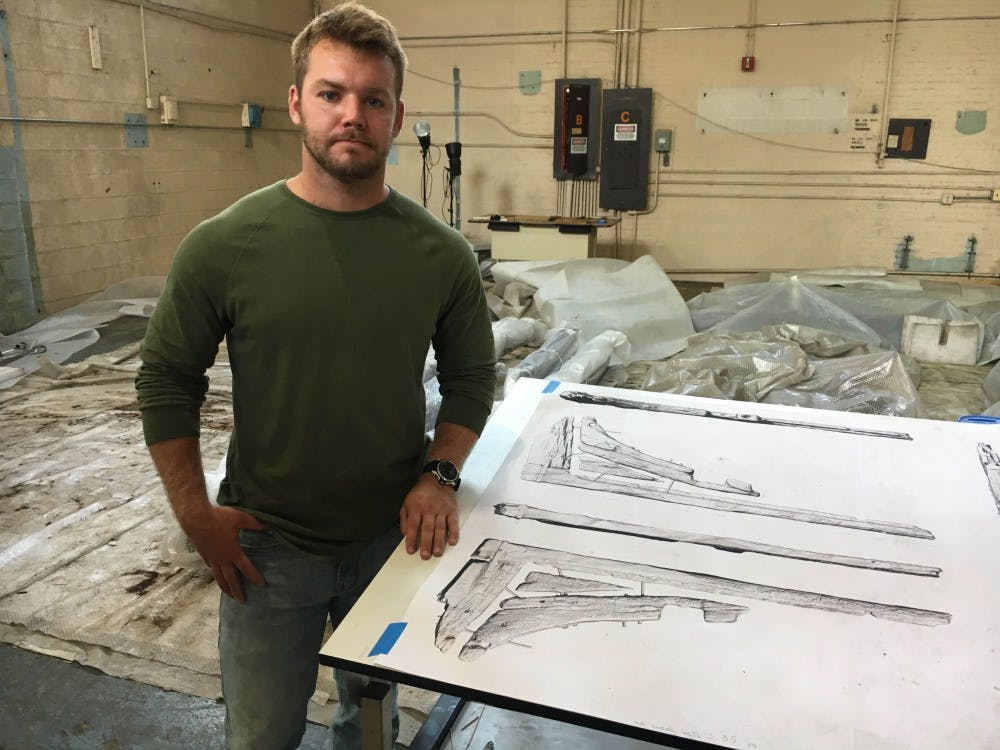Editor's note: Intern Spotlight is a Ball State Daily News series profiling Ball State students and their internships. If you have any suggestions as to who we should feature next, send an email to features@bsudailynews.com.
Evan Olinger recalls going through high school, surrounded by friends who thought he “would make a great history teacher” in the future.
Because of that, Olinger started his collegiate career as an education and history major at Manchester University.
However, while visiting friends at Ball State, Olinger said he had a “gut feeling” that he could see himself transfering to the university.
A year later, Olinger relocated to Ball State, where he decided to use his knowledge of history to pursue anthropology instead of education.
This passion led the senior anthropology and history major to apply for a maritime field program in Florida and an internship at the Underwater Archaeology Branch of the Naval History and Heritage Command of the Navy in Washington D.C., which shaped his new career path.
“I decided on underwater archaeology because it just seemed adventurous, new and exciting,” Olinger said. “I wanted to do something radically different than what I’d ever done before and challenge myself.”
Olinger’s parents, Eric and Gail Olinger, said their son’s sudden interest in underwater archaeology came as a surprise.
“We don’t live close to a lake, we don’t have a boat [and] we don’t go to the beach a lot,” Eric said. “It wasn’t something that we could see coming.”
Evan’s interest in underwater archaeology began last year when he applied to the summer maritime field school program at the University of West Florida.
When the program notified him of his acceptance, Evan was still in the process of completing his scuba diving certification at Ball State, which he needed in order to participate.
In the course of a week, Evan went from diving in a pool to exploring the shipwrecked ruins of the Luna Expedition — the only remains of an expedition from Veracruz, Mexico to Pensacola, Florida in 1559 — off the coast of Pensacola Bay.
During his time diving, Evan found small treasures in the sand, including the pieces of an olive jar inscribed in artistic print that he said was once used by Spanish sailors as storage containers.
“I was holding it in my hand after the dive, and you knew that that hadn’t been held in a person’s hands in 450 years, so the last person to touch it was a Spanish sailor back in 1559,” Evan said. “You feel connected to that person in a way because the last time it was touched was years ago, so it connects you across time to that individual.”
Although Evan was not able to dive for new artifacts during his recent internship, he assisted the Army Corps of Engineers, a group of soldiers who work to strengthen national security through infrastructure maintenance and research, in identifying potential war graves off the coast of Florida and conducted research on a colonial-era British schooner, the Royal Savage.
His time at the Underwater Archaeology Branch of the Naval History and Heritage Command of the Navy in Washington D.C. also sparked Evan’s passion for adventure.
“History and archaeology have definitely given me the opportunity for adventure,” Evan said. “It’s been a wild two summers.”
After he graduates from Ball State, Evan hopes to continue diving for sunken artifacts and possibly listen to his friends’ suggestions by applying his experiences under the waves to his future classroom.
Contact Adam Pannel with comments at arpannel@bsu.edu.





